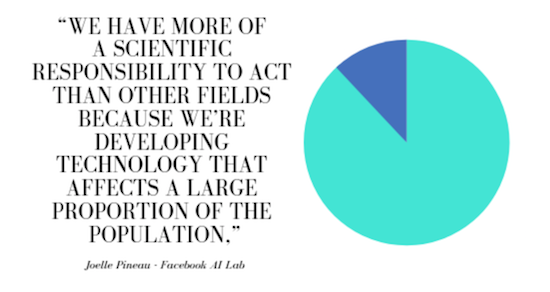An important angle to consider when it comes to making sure that machine learning and AI products and innovations are fair and inclusive is the collection and annotation of training data: the fuel that makes AI possible.
One of the most public and embarrassing stories that highlight errors when there are blind spots in training data is the infamous example where
Google labeled images of black people as gorillas.
These errors do not reflect a conscious bias on Google's part, but rather the unconscious bias that can happen when the creators of something are lacking representation from certain groups and don't catch bias or issues with the training data.
Google's response included the fact that they can't anticipate and test for "fringe cases," but likely this would not be a fringe case to engineers that look like the consumers that were surprised to see their pictures in an automatically created album named Gorillas. In 2017, Apple reported only
nine percent of their engineers are black, and the number working on machine learning is likely far less.
Biased Data Will Lead Us to the Wrong Conclusions
Before founding
Roovillage, Yukari Takata Schneider, PhD, MPH was a public health researcher and points out that most study participants in medical research are men.
Consequently, most health information and public health messages are tailored to their physiology.
For example,
heart disease/attack has a higher fatality rate for women than men. Why? Because we experience it differently, but society didn't know to tell us that, because that's not what the data said.
As Yukari puts it, "Data matters. Diversity matters. Diversity of data matters. Data informs policies, interventions, and their effects snowball from there. We need to make sure AI is learning from an inclusive data set."
Women Are More Conscious of the Consequences of Bias in Data
At a recent keynote panel entitled "Women in AI & Blockchain" at the 6th Annual Global Big Data Conference in Santa Clara, the panel was asked "Why do we need a Women in AI panel?"
Jennifer Prendki, PhD and vice president of machine learning at
Figure Eight, provided an example in which a group of machine learning engineers at her company, headed by mostly women, were working on a data set for a client and proactively pointed out several potential issues of bias with the training data and discussed how to proactively avoid issues of inclusivity that could come up.
Jennifer pointed out that women tend to be more sensitive to the potential negatives and hurt feelings that can happen when AI products are exclusionary, and she used this example to point out that having women on the teams that deal with the training data can help bring a proactive approach to avoiding bias that a male team would not necessarily place emphasis on.
There are not enough women working in machine learning and AI. Wired reports that
Just 12 percent of machine learning researchers are women, which is a worrying statistic for a field supposedly reshaping society. Until the deck is more evenly stacked, we need to raise the profile of women in the field to encourage other women to enter.

Source: Wired
What Do We Do About It?
Like most complex issues, there isn't one obvious solution, but acknowledging that there is a potential problem and being proactive in recognizing and correcting it are the first steps we can take.
One of the best ways to combat bias is to make sure that we put power in the hands of people that are able and willing to recognize bias—and in this case, when the bias impacts underrepresented populations, the most obvious answer is to increase their participation in the process.
Nikki Hallgrimsdottir is a co-founder at Algo.ai, where she leverages Artificial Intelligence, Augmented Reality, and Automation in a unique way to help retailers, distributors, and manufacturers create an agile approach to increase profits and cut costs.
Opinions expressed by the author are not necessarily those of WITI.
Are you interested in boosting your career, personal development, networking, and giving back? If so, WITI is the place for you! Become a WITI Member and receive exclusive access to attend our WITI members-only events, webinars, online coaching circles, find mentorship opportunities (become a mentor; find a mentor), and more!
Founded in 1989, WITI (Women in Technology International) is committed to empowering innovators, inspiring future generations and building inclusive cultures, worldwide. WITI is redefining the way women and men collaborate to drive innovation and business growth and is helping corporate partners create and foster gender inclusive cultures. A leading authority of women in technology and business, WITI has been advocating and recognizing women's contributions in the industry for more than 30 years.
The organization delivers leading edge programs and platforms for individuals and companies -- designed to empower professionals, boost competitiveness and cultivate partnerships, globally. WITI’s ecosystem includes more than a million professionals, 60 networks and 300 partners, worldwide.
WITI's Mission
Empower Innovators.
Inspire Future Generations.
Build Inclusive Cultures.
As Part of That Mission WITI Is Committed to
Building Your Network.
Building Your Brand.
Advancing Your Career.


Comments